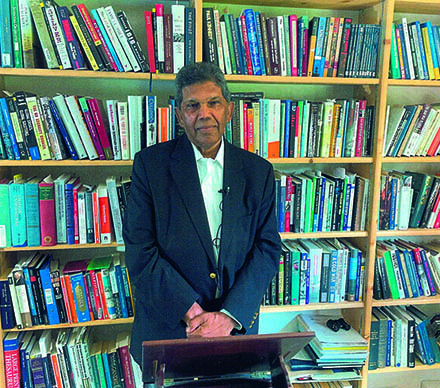By Dr Bertrand Ramcharan
At the start of Guyana’s term on the United Nations Security Council, its distinguished representative, Ms Carolyn Rodrigues-Birkett, one of the few indigenous persons ever to head a delegation on the Council, declared a people-oriented approach to Guyana’s tenure on the Council. This was an historic pronouncement, in keeping with the benevolent pulse of the Guyanese people.
Current events on the global stage will call for the application of this people-oriented approach, notably the on-going conflict in Gaza-Israel, which has seen terrible violence on both sides. In its history, the UN Security Council has had a rich practice of exercising a protective function but it has, at the same time, expressly declared ‘the primacy of politics’ as governing its overall approach. We have traced this bifurcated approach in a book coming out soon, The Protective Function of the UN Security Council.
Article 51 of the UN Charter states that “Nothing in the present Charter shall impair the inherent right of individual or collective self-defence if an armed attack occurs against a Member of the United Nations, until the Security Council has taken measures necessary to maintain international peace and security. Measures taken by Members in the exercise of the right of self-defence shall be immediately reported to the Security Council and shall not in any way affect the authority and responsibility of the Security Council under the present Charter to take at any time such action as it deems necessary in order to maintain or restore international peace and security.”
The following points may be noted about the application – or non-application of the requirements of Article 51 in relation to the on-going conflict in Gaza-Israel. First, the Security Council has not sought to take measures necessary to maintain international peace and security. Rather, the primacy of politics has seen the exercise of US vetoes on this dossier. Second, it has been a painful process, with long delays, to get the Security Council to call for humanitarian measures for the protection and relief of civilian populations, and the numbers of civilian deaths have been tallied at around 1200 on the Israeli side and around 22,000 on the Palestinian side, not counting extensive injuries and destruction of habitats as well.
Third, as far as we know, there has been no report to the Security Council on measures taken in purported exercise of the right of self-defence. And fourth, there is no procedure inside the Security Council, and there never has been such a procedure, to monitor and supervise the application of measures taken in purported exercise of the right of self-defence.
Given the alignment of forces in the world at the present time, it may not be realistic to expect the Security Council to ‘take measures necessary to maintain international peace and security’. But what about the requirement for a State purportedly exercising the right of self defence to report to the Security Council on the course of action it is pursuing? And what about the need for a mechanism inside the Security Council to supervise and react to such reports.
It is a matter of law that states purportedly exercising the right of self-defence must report to the Council on the measures they are taking. The Security Council should, in the future, as part of a people-oriented approach, insist on the submission of such reports. The very act of writing and submitting them will focus minds in the Government of the state purportedly exercising the right of self-defence.
And could a Security Council Expert Committee on Self-Defence be tasked with examining and commenting on reports received from Governments purportedly exercising the right of self-defence? While the tasks of such an expert committee will require the exercise of delicate judgment, the very existence of such a committee could have a positive effect in the international management of such situations.
Last week, the International Court of Justice heard from South Africa, which charges Israel with the genocidal exercise of self-defence, and from Israel, which indignantly and vehemently denies this. Might the existence of a Security Council Expert Committee on Self-Defence have obviated the need to take this matter to the International Court of Justice? It is difficult to say, but the thought is worth pondering.
How might one address the lacunas in the supervisory competence of the Security Council when it comes to exercise of the right of self-defence? One approach could be to commission a research report on the matter, to convene an expert meeting to discuss the research report, and to provide recommendations for the consideration of members of the Security Council.
Might CARICOM commission such a research report and convene an expert meeting of the kind suggested? It would be a fitting Caribbean contribution to a people-oriented approach to the Security Council.






